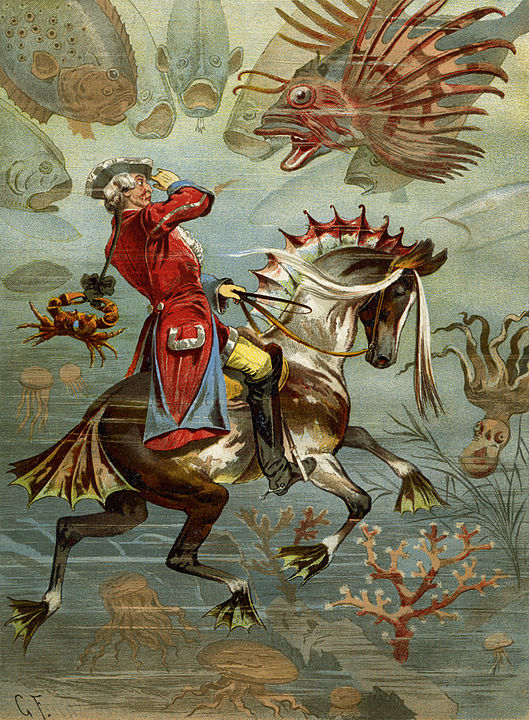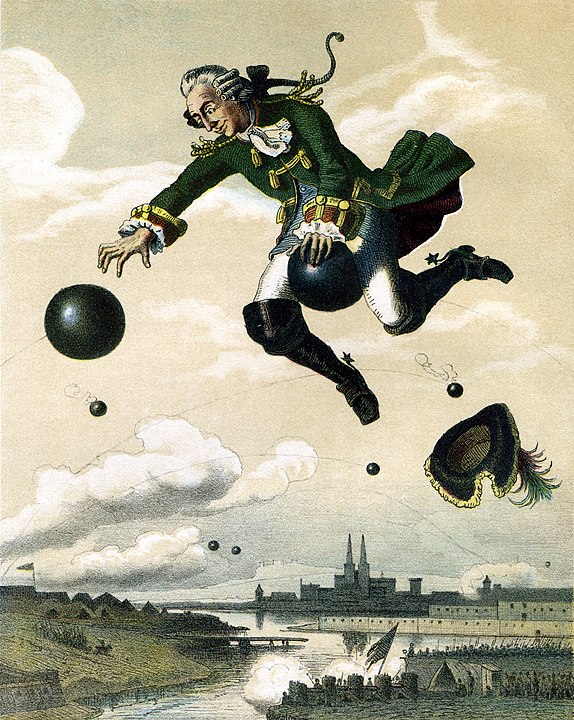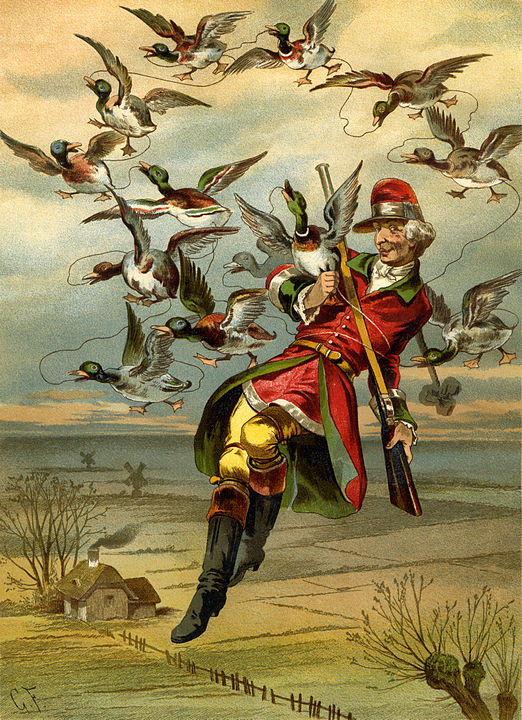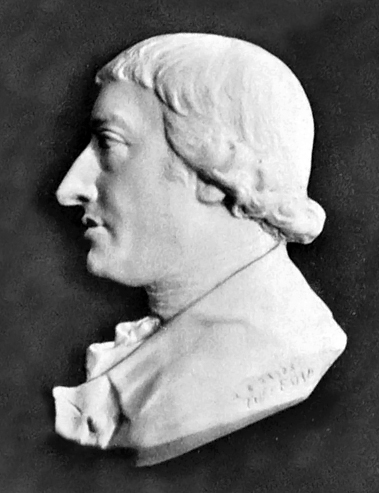In the year of our Lord 1760, a plucky university student named Rudolf Erich Raspe sat in a tavern in the outskirts of Goettingen. He had not a single penny in his pocket, but his throat felt as dry as the plains of Prussia on Walpurgis Night. His plans that evening were utterly predictable – it was only a matter of time before he would eventually approach the rowdy company of jolly fellows banging bottles – and not only bottles – in the farthest corner from the fireplace.
‘Pray sir’ he asked to a Captain of the Hussars ‘who may be that gentleman, who appears to hold court with his stories?’
The Captain belched for so long it felt like the Spring had come and gone.
‘That, my plucky friend, is the Baron Karl Friedrich Hieronymus Munnikhouson, commonly pronounced Munchausen.
He doth enjoy relating his singular travels, campaigns, voyages, and sporting adventures – best if over a bottle of fine wine – and even bester if surrounded by his friends!’
Raspe’s ears pricked.
‘May I join?
‘Are you a friend?’ asked the Captain?
‘How can I become one?’ asked Raspe
The Baron now intervened; his curiosity tickled by the new arrival. He had three questions for Raspe:
Do I owe you money?
Did I ‘pluck’ your sister and/or wife and/or mother and/or brother in a moment of confusion?
Will you attempt to convert me to some form of religion or otherwise try to sell me a lame horse, a blunt sword, a dampened pistol or other property of dubious value?
Raspe’s three ‘no’s’ boomed across the vaulted ceiling of the Bier Hall.
The Baron Munchausen extended his hand. ‘You may join us’ he said ‘All you need to enjoy this company is a pair of ears, a welcoming throat and a capable stomach’
And this is how writer, thief, conman and generally well-rounded rogue Rudolf Erich Raspe came to know about our protagonist of today.
According to some, the Baron was a worthy and extraordinary man whose adventures deserved to be chronicled for future generations.
According to others, he was the Grand Vizier of Hogwash, the Margrave of Poppycock, the Archduke of Hokum and Rhubarb, undisputed Master of Creative lying.
Who can tell where the truth lay?
As I lift my chalice to Raspe, let’s unsheathe the sabre of narration and charge at the massed infantry ranks of boredom and indifference.

Of how a worthy man gave his name to an infamous condition known as …
The Munchausen syndrome! That’s right, you may have never heard of the Baron Munchausen, but surely you must have heard about this notorious neurological condition. A ‘syndrome’, unlike a disease, is a ‘collection of symptoms. The DSM-5 – that’s the ‘Bible’ of American Psychiatry – defines the symptoms of the Munchausen as follows:
Number one: You perceive your right arm as longer than left. Or your left foot as slightly larger than the right, or vice versa. Leading to wardrobe malfunction.
Number two: When sitting on a train, you can’t quite tell if it’s you that’s moving, or the train on the next platform.
Number five: You skip numbers when counting.
Number one: You perceive your right arm as longer than left. Or your left foot as slightly larger than the right, or vice versa. Leading to wardrobe malfunction.
Number three: You walk into the kitchen and you forget why.
Number six: You may, from time to time, feel trapped in a time loop.

Equally disturbing is the ‘Munchausen Syndrome by Proxy’, whereby the same symptoms are listed back at you in an erudite and slightly sarcastic accent.
The cure, and origin, for this syndrome can be traced back to the same person, our Baron friend. Being the first individual to identify the symptoms in one of his lieutenants, he subsequently embarked on a quest to the Isles of Langerhans, off the coast of Vaduz. There, he discovered an herb, known to the local monks as stercores bovinus, used to synthetize the treatment still in use today, acetyl-salicylic acid.
But this is only one of the countless adventures that Munchausen ticked off a big list snatched from the hands of Lady Death herself. I will try and relate them in some form of order, not that he ever tried to.
Of how the Baron made it to Russia and India
Baron Karl Fried – you know what, pluck it, I’ll just call him ‘the Baron’ from now on.
The Baron was born on the 11th of May, 1720, in Bodenwerder, Hanover, modern-day Germany. From birth to the age of 15, not much is known about his life. And by this, I mean I couldn’t really be bothered to delve deeper, because the great stories only happen later.
At the age of 15 our Baron was serving as a page to Anthony Ulrich II, who was the Duke of Brunswick. So, a fellow German, but who had been hired by the Russian Empire as the Commander in Chief of their Army. From 1735 to 1739, the Baron was by the Duke’s side, during the Russo-Austro-Turkish War. At this time, the Baron was too young to take part in any fighting, but he did become a skilled swordsman and horseman. By the end of the war, at the age of 19, he had been appointed cornet – or 2nd lieutenant – in the Russian Cavalry.
In November of 1740, the Baron was appointed 1st lieutenant and stationed in Riga. From there, his regiment was recalled South to take part in a further campaign against the Ottomans, in 1741.
Willing to test his cavalry skills, the Baron decided to travel away from his regiment, during the coldest days of winter. One afternoon, the sun sank so low, so early, that he could not see anything in front of him. He decided to stop early for the night: he tied his horse to a tree, tucked two pistols under his armpits and fell into a deep slumber.
When the Baron woke up the following morning, his pistols were there, but not the horse. He scanned the area but could not recognize the surroundings … he had fallen asleep next to a tree and now he was in a cemetery? Then he looked up and there he was: his horse. On top of a bell tower, tied to the steeple.
He understood what had happened: the snow had fallen so heavy the day before that it had covered a whole village, its church and graveyard. What the Baron thought to be a tree was actually the church bell steeple.
Then, during the night the snow had melted, with the horse left stranded on top of the tower. The Baron was a quick thinker and a good shot. He aimed with one of his pistols and fired a shot. The bullet tore through the rope holding the horse. Now relieved, the faithful steed jumped gracefully back to the ground.

The Baron now had to catch up with his regiment, so he logically decided to attach a sled to his horse. Maybe not a faster transport, but definitely more in line with Russian customs. The Baron and his four-legged friend were merrily galloping in the woods, when they realised they had company: a huge grey wolf. And it was quickly gaining ground. The Baron lay low inside the sled, while the wolf jumped on the horse. The poor equine had no hope to survive the attack: the wolf plowed right through the insides of the horse, pushing himself deeper into the mangled body of its prey.
The Baron then had an idea. The wolf had just had a nice lunch at the expense of his horse? Well, right, then, but it had to pay for it now! Not with its life, with its services. He quickly threw his horse’s harness onto the wolf and whipped it until the beast started running again, dragging Munchausen’s sled southward.
The Baron reached his Regiment and was commissioned with leading a squadron of light cavalry at the battle of Kimin and the siege of Umrunda.
[Caption: Kimin Umrunda?]
At the end of the aforementioned siege, the Baron was exhausted after leading his men into a victorious charge. His sword arm lay sore, for he had slashed countless Ottoman heads. He cantered to a fountain, to allow for his horse to drink.
The poor, thirsty steed swallowed gallon after gallon of water … and he just wouldn’t stop. Munchausen wondered how a horse could be such a bottomless pit. When he inspected the animal closely, he realised what had happened: enemy grapeshot had completely destroyed the rear half of the horse, and the water was flowing freely onto the pavement.
In need of another mount, the Baron set his eyes on a beautiful stallion, feared by his soldiers for being wild and untameable. Munchausen accepted the challenge, and he mounted him, over and over, with breathless abandon. By the time he was finished, his ride was so obedient that he had him jump onto a table laid out for afternoon tea, and made him dance around the crockery, without breaking a single cup.
By 1742, the Russian and Ottoman Empires had reached a peace settlement. The Baron took the opportunity to travel to the Sinai, to oversee a pet project of his: the dig of a canal connecting the Mediterranean with the Red Sea, via Suez.
While there, he befriended some English officers of the East India Company, who told him about their troubles with a dreadful Indian warrior, Tippoo Sahib.
Munchausen took a couple of days off from the Canal and set off for Madras, where he recruited a force of Sepoys to pursue Tippoo’s forces. The tyrant fled to his castle in Seringapatam, where Munchausen gallantly offered to settle their scores with a duel.
As Munchausen rode toward the gates of the fortress, Tippoo’s artillery opened a barrage against the charging hero. The Baron told Raspe how, in his youthful strength, he was able to grab the cannon shot in mid-air and then fling those balls back at his enemies:
“I caught them in my hands like so many pebbles, and throwing them against the fortress, demolished the strongest ramparts of the place.”
Finally, Tippoo accepted the offer to decide the battle by mortal combat. The fortress gates opened, and out he rode. On an elephant.
After an exchange of shots from both sides, the Baron took the fight to close quarters. He grabbed Tippoo’s long and firm proboscis with both hands, and turning it against him, used the appendage to strike him repeatedly on the head.
Sorry, did I say Tippoo’s proboscis? It was his elephants’ trunk, of course.
The warlord retaliated by slashing madly with his sabre, gifting the Baron with two facial scars he wore proudly to his last day. Munchausen was no slouch when it came to dueling, and with a single cut of his sword, he amputated Tippoo’s right arm, before finally beheading him.
The Spy in the Harem
The tale of the Baron’s exploits rebounded from trading post to tavern, from brothel to Embassy, from secret lodge to the Courts of Europe.
When Munchausen returned to St Petersburg, he was summoned for a private hearing by none other that the Empress, Tsarina Elizabeth Petrovna. She had a delicate mission to entrust him, as a double agent within the ranks of the Ottomans – now at peace with Russia, but not to be trusted.
The Baron had to ingratiate himself within the entourage of a Prussian Coronel, Count Ignatius Cornelius Hypatius Weissesnicht.
The Count was soon due to reach Constantinople to take a post as military advisor to the Ottoman Sultan, Mahmud the 1st, known as ‘The Hunchback’.
Munchausen’s mission was simple: pretend to work alongside the Count, while collecting military intelligence on the Ottomans and report everything back to St Petersburg. His messages would be encoded into the chess moves of a popular automaton of the time, known as ‘The Mechanical Turk’.
The following adventure combines Raspe’s accounts with the diaries of a Turkish courtier, Captain Güvenilmez.
After two weeks at the Sultan’s palace, the Baron had gathered only scarcely useful information. Finally, one morning, he struck gold.
He bribed a eunuch, who showed him a secret passage into the Harem of Mahmud the 1st. From there, he could eavesdrop on the Sultan’s pillow talk with his favourite lovers. One was of particular interest to Munchausen: she was a Kazak beauty called Otirik Periste, who had a vast knowledge of military history.
The Sultan loved to discuss strategy with her, especially the deep penetration of fast-moving mobile columns into enemy territory.
Several weeks of successful military reports followed, until one morning, the Baron — a light sleeper — heard heavy footsteps outside his door, accompanied by a rattling of sabres and clicking of flintlocks. He recognised the voice of Count Weissesnicht, giving orders to a platoon of Janissaries: they were coming for him!
According to Raspe, he had been betrayed by the eunuch. Captain Güvenilmez instead claims that it had been Otirik, the Kazak favourite. The Baron and Otirik had had a brief affair, but the deceitful angel had reported him to the Palace Guards.
Whatever the reasons, the Baron’s cover was blown! Thunders in heaven and pestilence on Earth!
Of all the things one could have had blown, that was his least favourite.
The Baron made his escape, but soon realised he had been cornered by the Count. The Count had chased him into a blind alley. A cul-de-sac.
But the Baron kept his cool and kicked him in the sack. As the Count was writhing on the floor, Munchausen flung open a window and jumped to safety.
Here, opinions differ. According to Captain Güvenilmez, the Baron landed on a pile of manure. From there, he jumped into the sea and swam to a Russian frigate moored at port, the ‘Legkovernyy’.
Raspe, who later confessed to being drunk when he wrote this chapter, claimed that the Baron fled the citadel of the Sultan by riding a flying cannon ball, leg astride and hands barely holding onto his tricorn hat. This was the origin of a popular depiction of the Baron, immortalised by many artists, including the great engraver Gustave Doré.
Uninvited Guests
This tale was told by Baron Munchausen to Raspe in his later years, during one of the many evenings of storytelling among friends.
Now, one important detail.
When the Baron entertained, he always ensured to leave an empty chair by the fireplace. As nights wore on, he’d often ask his butler whether the special guest he was waiting for had arrived.
Raspe’s publisher, Gottfried A. Buerger, had inferred that the guest was the love of Munchausen’s life, Khadija Khayali, youngest daughter of the Imam of Sana’a. They had met in September 1746; after a shipwreck off the coast of Aden, the Baron and his horse, unconscious and dragged down by debris, were one inch away from drowning.
The beautiful Khadija, disguised as a pearl diver of the Red Sea, not only rescued both from the fury of the waves, but she also dragged to the shore the Baron’s travel companions. One was a man with metal bars strapped to his feet. This is because his legs were so fast that he had to shackle them, lest he altered the rotation of the Earth with his running speed.
Another was a Hunter, blessed with prodigious aim and a sense of hearing so fine he could hear a blade of grass growing two miles away.
The third one was a Strongman, so powerful that he could tear down a whole forest, simply by throwing a rope around its trees and then pulling them down with just one arm.
The fourth companion was a man known for the Wind he could produce. Not what you might think… His lungs were so mighty that when he blew, he could raise a windstorm and set ships sailing at 20 knots or faster.
The Imam of Sana’a welcomed the colourful company of strangers, even though he was wary of the sweet nothings that the Baron whispered in Princess Khadija’s ear. The Imam was a devout Muslim, but he kept a good cellar of vintages to honour his European guests. When the Baron commented that the 1734 bottle of Chateau Neuf du Pape tasted like cork, the Imam seized the opportunity to get rid of the suitor.
If the wine was not to his liking, the Baron could go and get his favourite bottle in Vienna … but he only had one hour. If he lost the bet, the Imam would cut his head.
Naturally, Munchausen sent the Running Man on this errand to Vienna. The sprinter could get from Yemen to Austria and back in twenty minutes!
But after fifty-four minutes, he still had not returned. The Baron was sweating cold, and so was Khadija. The Hunter laid his ear on the ground, and somehow, he perceived that the Runner was snoring, asleep under a tree! The Hunter then took aim with his bow and shot a prodigious arrow, which hit the bark of the tree, waking up the Running man. Thirty seconds later, the bottle of wine from Vienna was in the Baron’s hands.
Nonetheless, Munchausen was not safe yet. Khadija slipped into his bedroom that night to warn him that the Captain of the Guards was planning to have him beheaded anyhow. The Baron was one for pre-emptive strikes: he instructed his strong man to tear down the walls of the Palace vaults, and with the help of his companions he grabbed as much gold and jewels as he could. The five rascals, with Khadija in tow, jumped aboard a Dutch schooner for their escape.
The Imam’s fleet was in hot pursuit, but Mr. Windy was able to raise such a storm that all of the pursuing ships were ran aground.
The Baron and Khadija lived in sin — that is, without marrying — for almost a year. Their bliss was interrupted by sad news from Sana’a: the Imam and all his children were bed-ridden with a mysterious plague, and the Reign was leaderless. As the sole healthy heir, Khadija had to return to Yemen and fulfil her duties as Queen.
It is not clear why the Baron did not follow her; Raspe actually disputed this story. Munchausen’s main chronicler barely mentions Khadija and had a completely different notion about the mysterious, uninvited guest.
She was a Lady whose attentions our good Baron had dodged countless times in his adventures, of which I have presented but a small sample. She was a Lady whom the Baron knew would come, sooner or later, to collect her dues.
On the freezing night of February 22, 1797, Raspe and the other friends sat around the Baron, waiting for him to begin his next tale, taller than the previous one. But that night the Baron sat silent, staring into the crackling logs in the hearth. Only the Captain of the Hussars – by now a General – dared to prompt him.
‘We are ready, Munchausen’. The Baron stood up, his joints creaking.
‘So am I’ he replied. ‘My guest has finally arrived’.
Raspe knew who she was: the Maiden in Black, the ultimate leveller and equaliser, Lady Death.
And so, it was that Baron Munchausen closed his eyes, readying himself to spin a final yarn in front of the Pearly Gates.
Final Words
Our longtime followers know that on April Fools’ Day we cover imaginary characters as if they were real. Today we went for something kind of different.
Baron Munchausen was a real-life person, a German officer who served in the Russian Army. Rudolf Erich Raspe was also real, and had actually met the Baron when he was a student. The military man had a reputation for entertaining friends with his war stories … many of which were exaggerated, or plain made-up!

Taking inspiration from him, Raspe wrote his satirical novel, ‘The Surprising Adventures of Baron Munchausen’, first published anonymously in London in 1786. The novel was later edited and expanded by Gottfried Buerger, and republished in 1788 as
‘Singular Travels, Campaigns, Voyages, and Sporting Adventures of Baron Munnikhouson, commonly pronounced Munchausen; as he relates them over a Bottle when surrounded by his Friends’
In subsequent print runs of this work, it became something of a tradition for editors to add outrageous tall tales to the narrative. Ex Monty Python Terry Gilliam chipped in with his film adaptation of 1989, starring John Neville, Uma Thurman and Robin Williams. And it may – or may not be – that we have joined this tradition with some stories of our own imagination …
For example, the Munchausen Syndrome? The actual definition is
“A mental disorder in which a person repeatedly feigns severe illness so as to obtain hospital treatment.”
The related syndrome by Proxy is defined as
“A mental disorder in which a person seeks attention by inducing or feigning illness in another person, typically a child”
But as for the rest, I will leave it up to you to comb through our video, picking up what was fact, what came from Raspe’s novel, and what was plain, good old-fashioned Biographics BS.
I will leave some links in the description where you can download Raspe’s novel for free. I hope you enjoy it as much as we did and I really do hope you enjoyed today’s video. As usual … thank you for watching.
SOURCE:
The Surprising Adventures of Baron Munchausen https://archive.org/details/munchausen00unknuoft/page/n4/mode/2up



